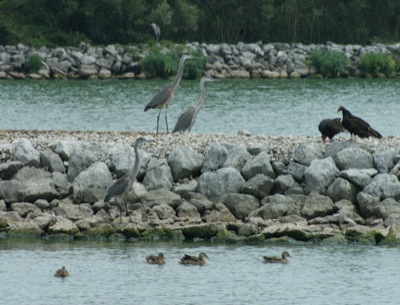Wednesday, August 4th, 2010
Illness claims under review
By Shelley Grieshop
GRAND LAKE - More than a dozen people claim to be sick due to exposure to toxins in Grand Lake, although officials say they may never be able to confirm the link.
Grand Lake is one of three in Ohio with posted health advisories due to algae blooms, but is the only one suspected of making people ill, a state health official said Tuesday.
A water quality advisory remains in place for the 13,500-acre inland lake to warn people not to swim, boat or eat the fish caught within its shores due to the unsafe toxin levels produced by the blue-green algae.
Fourteen people have contacted local and state officials since July 9 complaining of various symptoms they believe are related to exposure to Grand Lake, according to Jen House, spokeswoman for the Ohio Department of Health.
"Two of those were excluded after it was determined they had no contact with the water," House said.
The dozen suspected victims range in age from 9 months to 73 years old, she added. None of the cases are life-threatening. Danny Jenkins of Celina is one of the 12 victims. The 43-year-old has serious neurological problems that a local infectious disease doctor believes is directly linked to the lake's water.
House noted there is no specific test to administer to humans to confirm the algae problem is the cause of their illnesses.
"What we are doing is trying to rule out other possible causes," she said. "We're asking a lot of questions."
House said the state is looking at pre-existing conditions that could have caused some of the symptoms victims are experiencing such as dizziness, cramps, drowsiness, poor vision, elevated liver enzymes and others. She admitted the investigation is a tough endeavor.
"Even the folks at the CDC (Centers for Disease Control and Prevention) don't know too much about these toxins," House said. "Right now, all we can tell people is if you don't want to become sick, don't come in contact with the water."
Joyce Jansen, director of nursing and infectious disease for the Mercer County-Celina City Health Department, said the laboratories her agency uses are not set up for this type of testing.
"It would be rare to find a lab that could," she said. "We're dealing with the unknown here; we don't know that much about it."
Jansen also noted the toxins released by the blue-green algae likely wouldn't stay in the human bloodstream long enough to be detected.
Area hospitals, physicians, emergency care centers and health departments have been instructed to report to the state any cases that may be linked to the lake, she said. Jansen said her job now includes following up on each case and educating the public.
Algae bloom woes are surfacing across the state. The Ohio Department of Health on Tuesday posted an algae bloom advisory for Cutler Lake in Blue Rock State Park, east of Columbus. An algae advisory also remains in affect for Burr Oak State Park in southeast Ohio.




